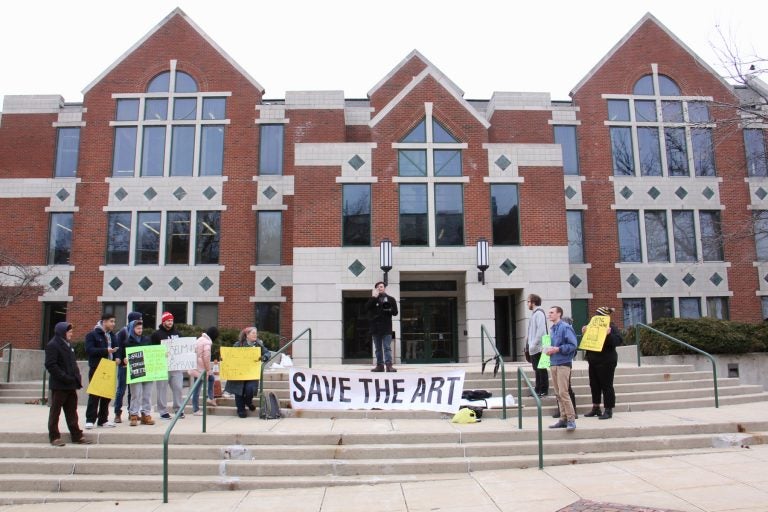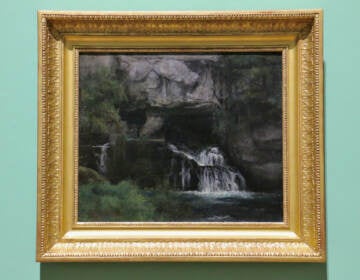La Salle students turn up heat in protesting university art sale
La Salle University in Philadelphia is getting pushback on several fronts over its decision to cull its art collection.
Listen 1:57
About 20 people turned out for a protest in front of La Salle University's Connelly Library. They object to the decision by the university's board of trustees to sell 46 works of art to pay for educational programs. (Emma Lee/WHYY)
Next month, La Salle University plans to auction off 46 pieces of art — including some of its most valuable paintings — from its museum collection to raise an estimated $5 million to $7 million for strategic educational programs.
That is not sitting well with some students.
Stand in swirling snow Tuesday outside the campus library, about 15 students held signs and shouted into a megaphone to protest the sale. The Friends of the La Salle Art Museum, who called the art collection an educational component of the campus, said that culling its most important pieces would do irreversible harm to the humanities program.
“Brother Daniel Burke, who was one of the former presidents and really built this collection, did it as an encyclopedic collection to teach people about art and open it to the community,” said La Salle senior Paul Fitzpatrick, a co-founder of the protest group. “This is our Heritage Week, this week. If we’re not walking the talk — if we’re not protecting something that was given to us in good faith, how is that good?”
Since the announcement of the art auction over the winter break, the student group has been rallying support to convince university administrators to retain the artwork.
“Basically, bridging dialogue,” said Fitzpatrick. “A lot of people don’t know about the sale.”
A few weeks ago, the group presented university President Colleen Hanycz and its board of trustees a letter signed by 300 La Salle alumni urging them to reconsider the sale.
Likewise, the university’s Faculty Senate sent its own protest letter, complaining the administration has been “at best vague on the motivation for the sale, offering little to no detail on how the proceeds would be spent.”
In a written response, the president and board chair said they are running a whole university, not a just its museum, and that recent financial challenges “present difficult choices and decisions to ensure our students and the university are successful.”
Like many private universities, La Salle’s enrollment has dropped — about 17 percent since 2012. In response, Hanycz strategically dropped tuition fees this academic year to attract more students. The art sale could help cover the reduced tuition revenue.
The American Association of Museums, which governs best practices in museums across the country, is opposed to the sale, stating that a “different governance structure does not exempt a university museum from acting ethically, nor permit them to ignore issues of public trust and use collections as disposable financial assets.”
That’s an ethical call. From a legal perspective, the university can use its art collection as so many financial assets if it wishes — unless those who donated the art had outlined restrictions at the time of the donation on how the art could be displayed, loaned, or sold. Pennsylvania Attorney General Josh Shapiro is currently reviewing the matter for any legal questions.
The paintings are to be included in auctions on April 18 and 19 at Christie’s New York.
WHYY is your source for fact-based, in-depth journalism and information. As a nonprofit organization, we rely on financial support from readers like you. Please give today.





